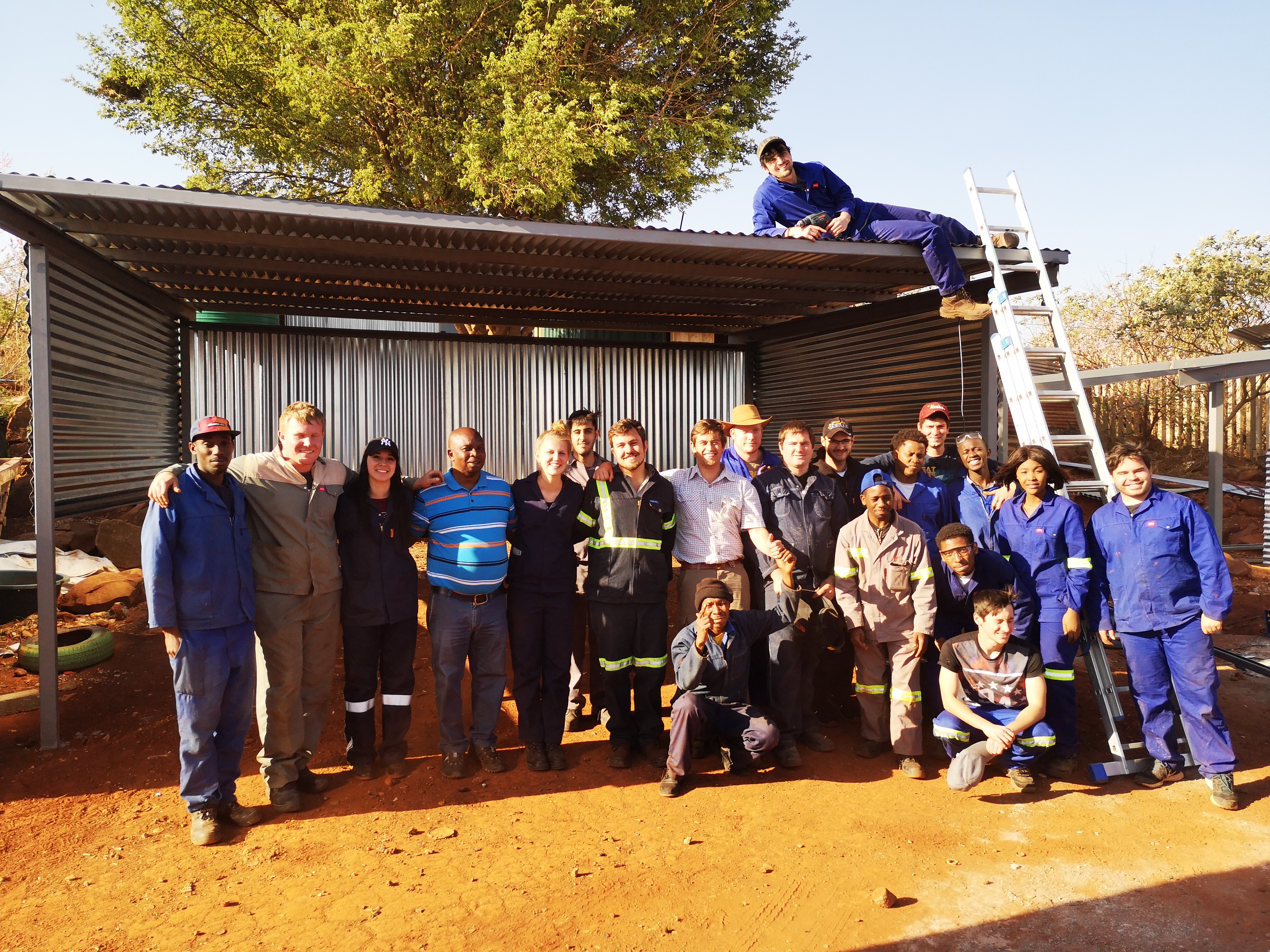The Faculty of Engineering, in partnership with Dr Melinda du Toit from the Centre for Social Development in Africa (CSDA) at the University of Johannesburg (UJ), reached out to the Itsoseng Women’s Project in Drieziek extension, Orange Farm township to collaborate with members and leaders of the community to address challenges identified by the community.
The Itsoseng Women’s Project (IWP) was established 22 years ago by community activists Richard (Bricks) Mokolo and his wife, Gladys.
The IWP was developed primarily to offer community members an opportunity to have access to a preschool and free paralegal advice, and an option to earn a small income through waste recycling. These initiatives of the Mokolo couple provide community members with a space where they are listened to and where they can rely on individuals who can advocate their pleas and concerns to the relevant authorities.
Engineering students who were enrolled in the Fundamental Engineering Application Programme (FEAP) were divided into groups of six students each. Their assignment involved the planning, designing and executing of an engineering project. The aim of each of these FEAP projects was to assist in addressing challenges faced by their real-life “clients”. The IWP in Orange Farm was one of the beneficiaries and a real-life client of groups of FEAP students.
“Since 2016, when our involvement at IWP started, we have already reconstructed access doors, and set up a rainwater collection system, a vegetable tunnel and an irrigation system for their food-gardening project,” says Hannes du Toit, project manager of community engagement at the Faculty of Engineering.
In addition, the engineering students expanded the legal advice centre’s consultation facilities. Added to this, they executed a pilot project that comprised the transference of basic technical skills to the workers at the recycling facility. One financially viable project that could potentially generate an income for people in the community was to construct dog kennels from recycled conveyor belts.
Although the FEAP programme, which was designed to teach students to apply engineering principles to real-life challenges, ended in 2019, opportunities opened up to develop partnerships with other disciplines and research institutions to engage in transformative transdisciplinary projects. One such partnership, which is foreseen to take effect in 2020, is a collaboration with the CSDA at UJ. The ultimate goal of this collaborative project is to design and implement a psychosocial advice centre in Orange Farm.
The community engagement of the NWU’s Faculty of Engineering will therefore focus on two main issues at Orange Farm. Firstly, the faculty will continue to develop a technical maintenance team to maintain the school, the advice centres, the recycling facility and the food-gardening project. Such a technical maintenance team can ensure that the existing infrastructure, as well as facilities developed by previous FEAP groups, can be technically maintained and operated independently of contractors. This technical maintenance team will also be empowered to start manufacturing products that could potentially generate additional income for the IWP. The manufactured products will be designed by staff and students of the NWU.
Added to the above training and development of technical skills, it is anticipated that colleagues from the Department of Economic Sciences from the NWU and UJ will also become involved in this multi-institutional and multi-disciplinary endeavour by presenting training and workshops in business and management skills.
Secondly, the students from the faculty will, as part of their community engagement projects, work in collaboration with a behaviour modification and neuropsychology team of the CSDA to design and implement a programme to improve learners’ study competencies and motivation. The focus of this study-enhancement programme will be directed specifically at heightening attainment levels in Mathematics and Physical Sciences.
“The performance in Mathematics and Physical Sciences is directly influenced by ability, personality and study orientation. Study orientation is influenced by study attitude, learning anxiety, study habits, problem-solving, study milieu and information processing. With the study-enhancement programme at the Siyakuzwa psychosocial advice centre we hope to address these study-orientation factors through mentoring and a study-buddy programme in collaboration with the NWU engineering students. The focus of this mentoring and study-buddy programme will mainly be on engaging the engineering students in encouraging experimentation, providing additional resources, providing additional practising opportunities, gamifying study content, and creating a safe relationship and partnership space to stimulate a positive study orientation. We at the CSDA are very excited about the prospect of collaborating with the Orange Farm community as a multidisciplinary, multi-institutional team,” says Melinda du Toit.



The students and community members during their engineering project. They addressed challenges faced by their real-life “clients”.
